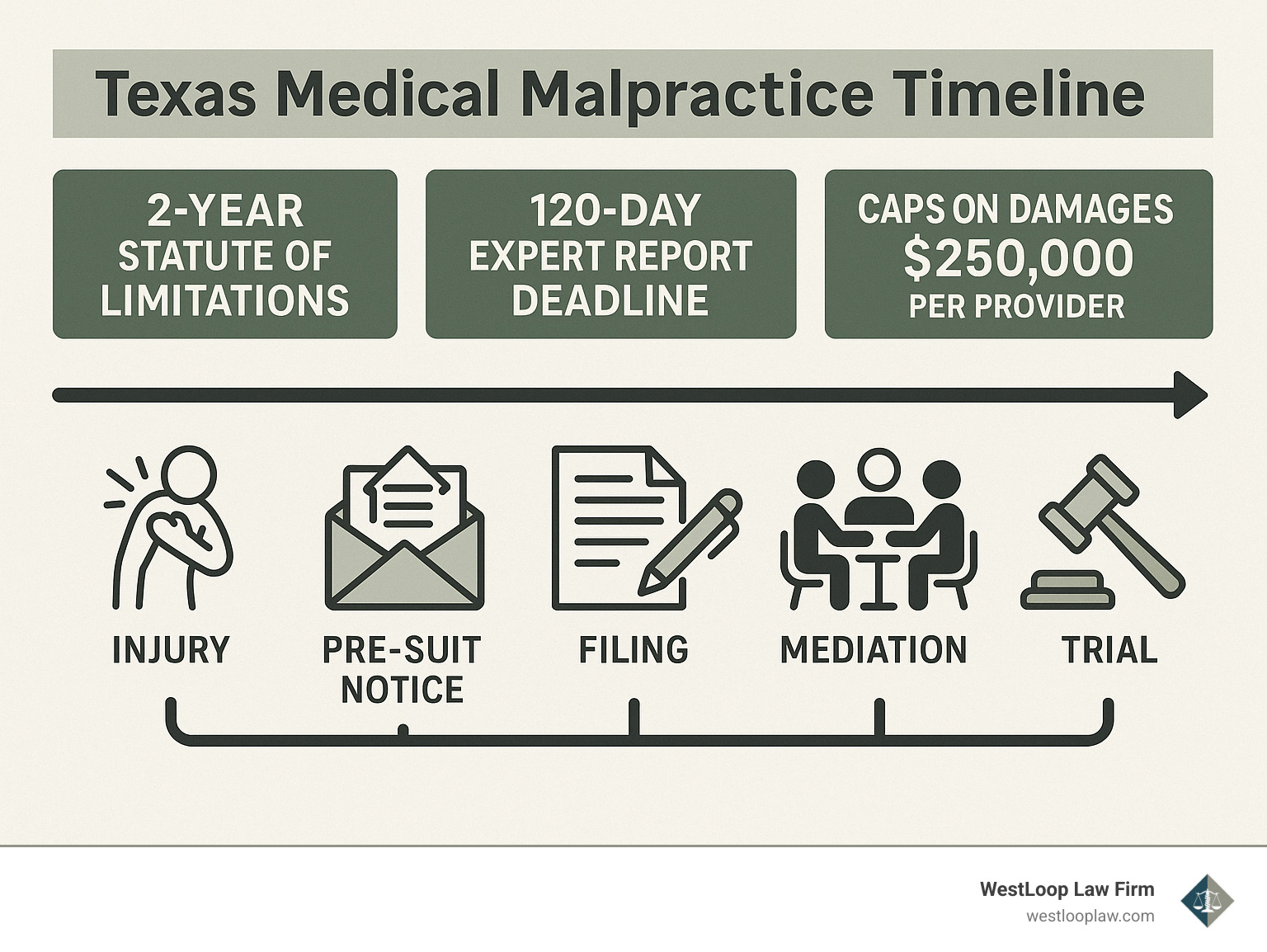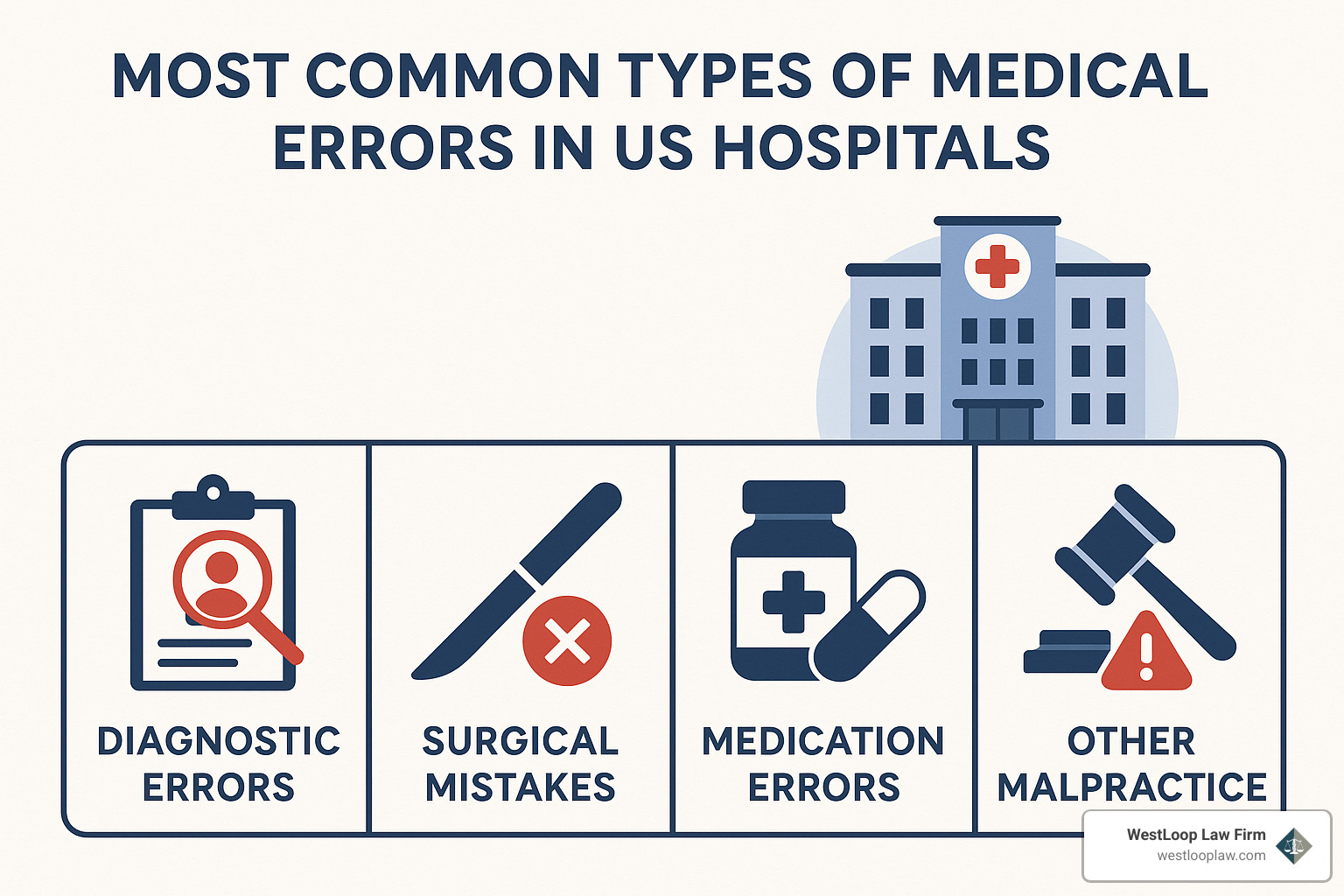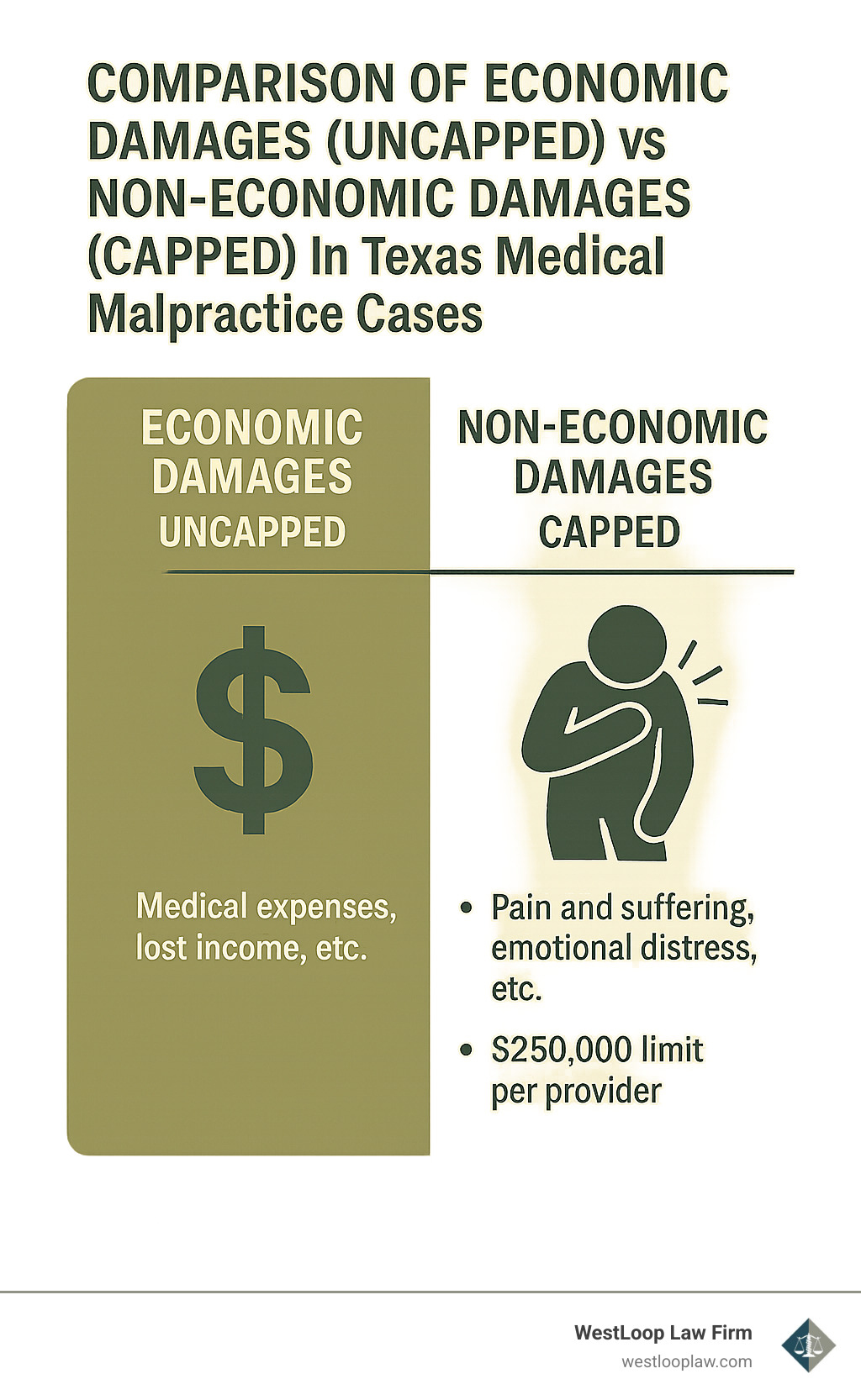When Medical Care Becomes a Liability: Understanding Hospital Malpractice in Houston
If you’re searching for a hospital malpractice attorney Houston, here’s what you need to know:
- Statute of Limitations: You have only 2 years from the date of injury to file a claim in Texas
- Damages Cap: Non-economic damages are capped at $250,000 per provider and $500,000 total for healthcare institutions
- Legal Requirements: You must prove duty of care, breach of standard, causation, and damages
- Free Consultations: Most Houston malpractice attorneys offer free case evaluations and work on contingency (no win, no fee)
- Expert Testimony: Texas law requires a qualified medical expert report within 120 days of filing
When you place your trust in a hospital or medical facility, you expect to receive care that meets established standards. Unfortunately, medical errors are now the third leading cause of death in the United States, accounting for an estimated 250,000 to 440,000 deaths annually. When healthcare professionals fail to provide proper treatment, the consequences can be devastating.
In Houston, Texas, victims of hospital negligence have legal rights, but navigating the complex medical malpractice system requires specialized knowledge. The 2003 Texas tort reform laws created significant problems for injured patients, including strict deadlines, damage caps, and expert witness requirements.
Medical malpractice occurs when a healthcare provider fails to deliver care that meets the accepted standard, resulting in patient harm. Common examples include surgical errors, misdiagnosis (33% of all claims), medication mistakes, and birth injuries.
If you or a loved one has suffered due to hospital negligence in Houston, it’s crucial to consult with an experienced attorney quickly. With only two years to file a claim—and sometimes even less if a government facility is involved—time is of the essence.
Key terms for Hospital malpractice attorney Houston:
– Houston birth injury attorney
– Houston wrongful death attorney
– best medical negligence lawyers
What Qualifies as Hospital Malpractice in Houston?
When you visit a hospital, you expect quality care. But sometimes, things go wrong in ways that go beyond normal risks. Hospital malpractice in Houston isn’t just about a bad outcome—it’s about care that falls below professional standards.
For a valid hospital malpractice claim, four crucial elements must exist: the healthcare provider must have had a professional duty to care for you, they must have breached that standard of care, this breach must have directly caused your injury, and you must have suffered actual harm as a result.
As the Legal Information Institute (LII) explains, medical malpractice is essentially “a medical misstep that results in injury to a patient.” In Houston hospitals, we see this happen in several common ways:
Misdiagnosis or delayed diagnosis can leave serious conditions untreated when doctors miss symptoms or incorrectly identify your condition. Surgical errors might include operating on the wrong body part or leaving instruments inside you. Medication mistakes happen when incorrect drugs or dosages are prescribed without checking for potential problems. Birth injuries can affect mother or child during labor and delivery when proper protocols aren’t followed.
Hospital-acquired infections, anesthesia errors, and failures to obtain proper informed consent also fall under malpractice when they’re preventable.
Here’s what’s important to understand: not every negative outcome means malpractice occurred. The question is whether your provider delivered care that fell below what a reasonably competent healthcare professional would have provided in similar circumstances.
Key Texas Definitions & Laws
Texas has specific rules for medical malpractice claims that make these cases particularly challenging.
Texas Civil Practice & Remedies Code §74.251 sets a strict two-year statute of limitations for filing medical malpractice claims. This clock typically starts ticking from the date of the incident or when treatment ended. For children under 12, there’s some protection—they have until their 14th birthday to file a claim.
Before filing a lawsuit, you must provide at least 60 days’ written notice to each healthcare provider involved. Once you file, Texas law requires you to serve each defendant with an expert report within 120 days that details how the standard of care was breached and how that caused harm.
Texas also follows a “modified comparative negligence” rule with a 51% threshold. If you’re found to be more than 51% responsible for your injuries, you cannot recover damages.
The Texas Medical Liability Act of 2003 dramatically changed the landscape for malpractice claims, creating significant problems for patients. This is precisely why having a knowledgeable hospital malpractice attorney Houston is essential—these cases are simply too complex to steer alone.
Learn more about medical malpractice in Houston
Common Houston Hospital Malpractice Scenarios
In our experience helping Houston patients, certain types of hospital negligence appear more frequently than others:
Failure to diagnose represents about 33% of all medical malpractice claims. This happens when doctors miss symptoms of serious conditions like cancer, heart attacks, or strokes that should have been caught.
Surgical errors account for approximately 24% of cases. These range from wrong-site surgeries to accidental damage to surrounding tissues or organs during procedures.
Failure to treat makes up roughly 18% of claims. In these situations, the doctor correctly diagnoses your condition but doesn’t provide appropriate treatment.
Houston’s busy emergency departments sometimes struggle with proper patient triage, leading to delayed treatment of serious conditions. Anesthesia complications, even from minor errors, can cause devastating outcomes like brain damage or organ failure. Radiology mistakes—misreading X-rays, MRIs, or CT scans—often result in missed diagnoses of serious conditions.
A major contributing factor we’ve observed is hospital understaffing. When facilities operate without enough personnel, healthcare providers become overworked and more likely to make mistakes. Studies consistently show that nurse-to-patient ratios directly affect patient outcomes—higher ratios lead to increased complications and mortality.
At WestLoop Law Firm, we’ve repeatedly seen how communication breakdowns between departments or during shift changes contribute to serious medical errors. When vital information about your condition, allergies, or medication needs isn’t properly shared, the consequences can be life-altering.
Do You Have a Valid Claim? Evidence & Evaluation
Figuring out if you have a solid hospital malpractice case isn’t always straightforward. At WestLoop Law Firm, we carefully look at both the medical facts and legal requirements to determine if your situation meets the criteria for a successful claim.
The backbone of any strong hospital malpractice case is compelling evidence. Without it, even the most heartbreaking stories can fall short in court. This evidence typically includes your complete medical records—everything from admission forms to discharge summaries, doctor’s notes, test results, and medication logs. These documents tell the story of what actually happened during your care.
Beyond medical records, we also rely on expert medical opinions from qualified healthcare professionals who can testify that your care fell below acceptable standards. Family members, visitors, or other patients who witnessed important events can provide valuable statements too. Don’t forget about physical evidence like photographs of injuries or defective medical devices, and keep all financial documentation showing your economic damages.
According to scientific research on duty of care, establishing what the standard of care should have been is absolutely critical in these cases. This standard varies depending on medical specialty, geographic location, and your specific circumstances.
For your claim to hold water, we need to show four key elements:
- A doctor-patient relationship existed (establishing duty of care)
- Your healthcare provider failed to meet the accepted standard of care
- This failure directly caused your injury
- You suffered significant harm as a result
That last point about “significant harm” is particularly important in Texas. Because medical malpractice cases are expensive and complex to litigate, claims involving minor or temporary injuries often don’t make practical sense to pursue. The potential compensation needs to outweigh the substantial costs involved.
Hospital malpractice attorney Houston checklist
Before you pick up the phone to call a hospital malpractice attorney Houston, take a moment to run through this quick self-assessment:
Did the incident happen within the last two years? Texas has a strict statute of limitations, so timing matters. Do you have documentation of the care you received? Can you point to specific actions (or lack of actions) that seemed improper? Have you suffered serious complications that weren’t explained as normal risks? Have other doctors hinted that your care was substandard?
Also consider whether you’ve incurred significant medical expenses or lost wages, if you’re prepared to share all your medical records, and if you can commit to what might be a lengthy legal process. If you answered “yes” to most of these questions, it’s time to talk with a qualified hospital malpractice attorney Houston.
Several warning signs might indicate potential malpractice, including unexpected complications that weren’t mentioned as risks, sudden changes in treatment plans without clear explanation, or healthcare providers who seem reluctant to explain what went wrong. Be wary if your medical records contain notes that contradict your experience, or if hospital representatives encourage you to accept quick settlements.
Learn more about proving negligence in Houston medical malpractice cases
First Steps After Suspected Negligence
If you believe you’ve been harmed by hospital negligence in Houston, taking quick and appropriate action can make all the difference. Your health always comes first, so consult with another doctor to address your immediate medical needs and get a second opinion.
Request copies of all your medical records right away—it’s your right under federal law. Keep a detailed journal of your symptoms, treatments, conversations with medical staff, and how the injury has affected your daily life. Take photos of visible injuries and hang onto all medications, devices, and discharge instructions.
Many hospitals have formal procedures for reporting adverse events, so file an incident report and request a copy. While you’re doing all this, be careful about discussing your case publicly—especially on social media—and avoid speaking with hospital risk management without legal representation.
Contact a hospital malpractice attorney Houston for a free consultation before the statute of limitations expires. Meanwhile, keep meticulous records of all expenses related to your injury—medical bills, prescription costs, transportation to appointments, and any home modifications you’ve needed.
Healthcare providers rarely admit fault, and hospitals have legal teams whose job is to minimize liability. What sounds like a sincere apology might actually be carefully crafted to avoid legal responsibility. This is exactly why having your own legal advocate is so important—to level the playing field and fight for the compensation you deserve.
Navigating the Legal Process with a Hospital Malpractice Attorney Houston
When you work with a hospital malpractice attorney Houston from WestLoop Law Firm, we guide you through each step of the complex legal process. Understanding this journey helps set realistic expectations about timeline and outcomes.
The typical progression of a hospital malpractice case in Houston includes:
-
Initial consultation: We evaluate your case, explain your rights, and determine if you have grounds for a claim.
-
Pre-suit investigation: We gather medical records, consult with experts, and build the foundation of your case.
-
Pre-suit notice: Texas law requires sending a formal notice letter to all potential defendants at least 60 days before filing a lawsuit.
-
Expert report preparation: We work with qualified medical experts to prepare the required report detailing how the standard of care was breached.
-
Filing the petition: We officially file your lawsuit in the appropriate court, naming all responsible parties.
-
Findy phase: Both sides exchange information through written questions, document requests, and depositions.
-
Mediation: Most cases go through mediation, where a neutral third party helps facilitate settlement discussions.
-
Trial preparation: If settlement isn’t reached, we prepare extensively for court, including witness preparation and exhibit creation.
-
Trial: Your case is presented before a judge or jury, who determines liability and damages.
-
Post-trial motions or appeals: Either side may challenge aspects of the verdict through various legal mechanisms.
This process typically takes 18-24 months from filing to resolution, though complex cases may take longer. Throughout this journey, we maintain regular communication about case developments and strategic decisions.
Learn more about navigating the medical malpractice process
Statute of Limitations & Tolling Rules
In Texas, timing is critical for hospital malpractice claims. The standard statute of limitations is two years from the date of the injury or the last date of treatment in the relevant course of care. However, several exceptions and “tolling” rules may apply:
-
Findy rule: In limited circumstances, the two-year clock may start when you finded (or reasonably should have finded) the malpractice, rather than when it occurred.
-
Minors under 12: Children under 12 have until their 14th birthday to file a claim, regardless of when the malpractice occurred.
-
Mental incapacity: If the patient is deemed mentally incompetent, the statute may be tolled until competency is restored.
-
Government facilities: If your claim involves a public hospital or government healthcare facility, you may have only six months to file a notice of claim.
-
Statute of repose: Regardless of when malpractice is finded, Texas imposes a 10-year absolute deadline (statute of repose) after which no claims can be filed.
-
Wrongful death: In cases where malpractice resulted in death, the two-year period typically begins on the date of death, not the date of the negligent act.
These complexities underscore why consulting with a hospital malpractice attorney Houston promptly is crucial. At WestLoop Law Firm, we carefully analyze these timing issues to ensure your claim is filed within all applicable deadlines.
Damage Caps & Compensation Explained
Texas law places significant restrictions on the compensation available in hospital malpractice cases. Understanding these limitations is essential for setting realistic expectations about your potential recovery:
Economic damages are not capped and may include:
– Past and future medical expenses
– Lost wages and loss of earning capacity
– Out-of-pocket expenses related to your injury
– Cost of necessary home modifications or assistive devices
– Long-term care expenses
Non-economic damages are capped at:
– $250,000 per individual healthcare provider
– $250,000 per healthcare institution
– $500,000 total cap when multiple healthcare institutions are involved
– Maximum possible recovery of $750,000 for non-economic damages
Non-economic damages cover intangible losses such as:
– Pain and suffering
– Mental anguish
– Loss of enjoyment of life
– Physical impairment or disfigurement
– Loss of consortium (impact on marital relationship)
Punitive damages are rarely awarded in medical malpractice cases and are capped at the greater of:
– $200,000, or
– Twice the economic damages plus up to $750,000 in non-economic damages
While economic damages are theoretically unlimited, proving future medical expenses and lost earnings requires substantial expert testimony and documentation. At WestLoop Law Firm, we work with economic experts, life care planners, and medical professionals to fully quantify the financial impact of malpractice on your life.
How to Choose the Best Hospital Malpractice Attorney in Houston
Finding the right hospital malpractice attorney Houston isn’t just about picking a name from search results—it’s about choosing someone who’ll fight for you when you’re at your most vulnerable. Medical malpractice cases are legal marathons, not sprints, requiring specialized knowledge and substantial resources to succeed.
When you’re looking for someone to champion your cause, here’s what truly matters:
Look for attorneys who eat, sleep, and breathe medical malpractice law—not just general injury attorneys who occasionally handle these cases. At WestLoop Law Firm, medical malpractice isn’t just something we do; it’s a core focus of our practice.
Board certification in personal injury trial law isn’t just another credential—it’s Texas’ way of recognizing attorneys who’ve demonstrated exceptional expertise. It tells you that peers and judges respect their work.
Your attorney should speak “medical” almost as fluently as they speak “legal.” The best malpractice lawyers maintain relationships with trusted medical experts and can translate complex medical concepts into language judges and juries understand.
While most cases settle before trial, hospitals and insurance companies offer fair settlements only when they know your attorney is ready and willing to step into the courtroom. Ask about their trial experience—it matters even if your case never sees a jury.
Medical malpractice cases require significant upfront investment. Expert witnesses often charge $500-1,000 per hour, and comprehensive medical record reviews aren’t cheap. Your attorney needs the financial stability to properly fund your case from start to finish.
Past results never guarantee future outcomes, but they do indicate experience. A track record of successful malpractice resolutions suggests an attorney knows how to steer these challenging waters.
Choose someone who explains complex concepts clearly and keeps you informed. You shouldn’t need a law degree to understand what’s happening with your own case.
We offer free initial consultations at WestLoop Law Firm because we believe you should have the chance to evaluate our expertise before making any commitment. It’s a conversation, not a sales pitch.
Learn more about reasons to hire a medical malpractice lawyer
Questions to Ask During Your Consultation
When you sit down with a potential hospital malpractice attorney Houston, come prepared with questions that reveal whether they’re the right fit for your situation:
“What percentage of your practice focuses on medical malpractice?” This simple question tells you volumes about their specialization. If it’s just a tiny fraction of what they do, they may not have the depth of experience you need.
Ask them directly: “Have you handled cases like mine before? What happened?” Their answer will reveal not just experience but also their honesty about potential outcomes.
Find out who’ll actually be handling your day-to-day needs. Some firms have senior partners do the initial consultation, then pass cases to less experienced associates. You deserve to know who’ll be your actual advocate.
A strong hospital malpractice attorney Houston has cultivated relationships with credible medical experts who can explain how your care deviated from accepted standards. Ask about their expert network—it’s the backbone of your case.
Understand the financial arrangement clearly: “How do you handle case expenses, and what happens if we don’t win?” Most firms work on contingency, but the specifics matter.
Pay attention to how they assess your case’s strengths and weaknesses. Beware of anyone promising specific dollar amounts or guaranteeing victory—that’s a red flag.
Communication breakdowns are a common client complaint. Ask about their update policy and how accessible they’ll be when you have questions.
Setting realistic timeline expectations helps prevent frustration. Medical malpractice cases typically take 18-24 months from filing to resolution, sometimes longer for complex situations.
Trial experience matters even if your case settles. Ask directly: “Have you taken medical malpractice cases to trial, and what was the result?”
Finally, ask what strategy they recommend for your specific situation. Their answer reveals their approach and gives you insight into their thinking process.
At WestLoop Law Firm, we welcome these questions. Informed clients make better partners throughout the legal journey.
Fee Structures & Costs
Let’s talk money—because understanding the financial side of hiring a hospital malpractice attorney Houston shouldn’t require a finance degree.
Most medical malpractice attorneys, including our team at WestLoop Law Firm, work on what’s called a contingency fee basis. In plain English, this means:
You pay nothing upfront. Not a retainer, not an hourly rate, nothing.
We only get paid if you do. Our fee comes as a percentage of your recovery if your case succeeds.
No recovery means no attorney fees. If we don’t win, you don’t pay us for our time.
The standard contingency fee for medical malpractice cases in Houston typically ranges from 33% to 40% of the recovery, with the higher percentage usually applying if the case goes all the way to trial. This arrangement aligns our interests perfectly with yours—we succeed only when you do.
Beyond attorney fees, these cases involve various expenses that someone needs to cover:
Medical records can cost hundreds or even thousands of dollars to obtain. Expert witnesses—absolutely essential in these cases—often charge $500-$1,000 per hour for their time. Add in deposition costs, filing fees, exhibit preparation, and sometimes travel expenses, and the investment required becomes substantial.
At WestLoop Law Firm, we typically advance these case expenses, recovering them from your settlement or verdict if successful. This approach means you can pursue justice without worrying about out-of-pocket costs during an already difficult time in your life.
During your free consultation, we’ll explain our fee structure clearly and provide a written agreement that outlines all financial aspects of our representation. No surprises, no hidden costs—just transparency about how the financial side works.
Frequently Asked Questions about Hospital Malpractice in Houston
What compensation can I recover after hospital malpractice?
When you’ve been harmed by hospital negligence in Houston, understanding your potential compensation helps set realistic expectations for your case.
Texas law allows recovery of economic damages with no caps, which means all your medical bills, lost wages, and future care needs can be fully compensated. This includes everything from emergency treatment right after the incident to long-term rehabilitation, home modifications, and even in-home nursing care if your injuries require it.
However, Texas does limit non-economic damages – the compensation for your pain, suffering, and emotional distress. These are capped at $250,000 per healthcare provider and a maximum of $750,000 total when multiple institutions are involved. While no amount can truly compensate for severe pain or a diminished quality of life, these damages acknowledge the very real human cost of medical errors.
For families who’ve lost a loved one, wrongful death damages may include lost financial support, the profound loss of companionship, and funeral expenses. These cases carry their own unique considerations and emotional weight.
At WestLoop Law Firm, we’ve seen how medical negligence impacts every aspect of our clients’ lives. That’s why we work with specialized medical and economic experts to build a complete picture of your losses – both financial and personal – to pursue every dollar you deserve within Texas law.
Who can be held liable besides the surgeon?
Medical care is truly a team effort, and when things go wrong, responsibility often extends beyond just the primary doctor.
The hospital itself can be directly responsible for system-wide failures. I’ve handled cases where hospitals failed to properly credential doctors with problematic histories, maintained inadequate staffing levels that made errors inevitable, or implemented flawed policies that endangered patients.
Nurses play a crucial role in patient care and safety. In fact, nursing errors account for a significant portion of hospital malpractice claims, particularly around medication administration and monitoring.
Other potentially liable parties include anesthesiologists who monitor vital functions during surgery, radiologists who interpret diagnostic images, and consulting specialists who provide critical input on treatment decisions. Even laboratory technicians whose test results guide treatment decisions can share responsibility when errors occur.
In some cases, pharmaceutical companies or medical device manufacturers may bear partial responsibility if defective products contributed to your injury.
Identifying all responsible parties isn’t about casting a wide net – it’s about ensuring full accountability and maximizing your potential recovery, especially considering Texas’s damage caps. Our thorough investigations at WestLoop Law Firm often reveal multiple points of failure that contributed to a single adverse outcome.
Are there exceptions to the two-year statute of limitations?
Yes, though Texas courts interpret these exceptions quite narrowly. Understanding these potential extensions could literally save your case.
The most widely recognized exception applies to children under 12, who have until their 14th birthday to file claims regardless of when the malpractice occurred. This extra time acknowledges that children’s injuries may take longer to fully manifest and that young families need time to recognize potential malpractice.
In limited situations, the findy rule may apply, meaning the clock starts when you finded (or reasonably should have finded) the malpractice rather than when it occurred. However, I’ve seen Texas courts apply this exception very cautiously in medical cases.
The continuing treatment doctrine can sometimes extend the filing deadline if you received ongoing care for the same condition from the same provider. Similarly, if a healthcare provider deliberately concealed their negligence, the statute may be paused until the concealment is finded.
Special rules may apply when foreign objects like surgical instruments are left inside patients, and if the malpractice rendered the patient mentally incompetent, the statute may be paused until competency returns.
Despite these potential exceptions, I strongly recommend consulting with a hospital malpractice attorney Houston as soon as you suspect negligence. I’ve seen too many valid claims lost because patients waited too long, hoping these exceptions would save their case. The safest approach is always to act promptly while evidence is fresh and options remain open.
Conclusion & Next Steps
The journey after experiencing hospital malpractice can feel overwhelming. You’re dealing with physical recovery, emotional trauma, and mounting medical bills—all while trying to understand a complex legal system that doesn’t always favor patients.
At WestLoop Law Firm, we’ve guided countless Houston families through this difficult terrain. We’ve seen how medical negligence changes lives and how the right legal support can make all the difference in your recovery journey.
Texas doesn’t make it easy for malpractice victims. The 2003 tort reform created a landscape of strict deadlines, complicated procedures, and frustrating damage caps. This is precisely why having knowledgeable advocates in your corner matters so much.
When you partner with a hospital malpractice attorney Houston from our team, you’re not just hiring a lawyer—you’re gaining allies who truly understand what you’re facing. We bring together medical knowledge and legal expertise, maintaining relationships with respected medical experts who can clearly explain how your care fell short of acceptable standards.
Timing is everything in these cases. With only two years to file—and sometimes even less for government facilities—waiting too long can permanently close the door to justice. We’ve seen too many deserving families miss their opportunity simply because they didn’t realize how quickly the clock was ticking.
Your path forward begins with a simple, pressure-free conversation. Our free case reviews give you the chance to share your experience, ask questions, and get honest feedback about your options. We’ll talk through the strength of your potential claim, explain how we work on a contingency basis (meaning you pay nothing unless we win), and outline what the journey ahead might look like.
Hospital malpractice cases aren’t easy—but neither is living with the consequences of someone else’s mistake. With WestLoop Law Firm beside you, you don’t have to face this challenge alone.
Ready to take the first step? We’re here to listen, to understand, and to help you make informed decisions about moving forward.
Contact WestLoop Law Firm for a free consultation about your hospital malpractice case






